모든소스 : http://www-igm.univ-mlv.fr/~lecroq/string/ ( string 알고리즘 이라는 책 사고싶네... )
1. Brute Force Text Search ( n*n 비효휼적 )
2. Karp-Rabin Text Search
3. Shift Or Text Search
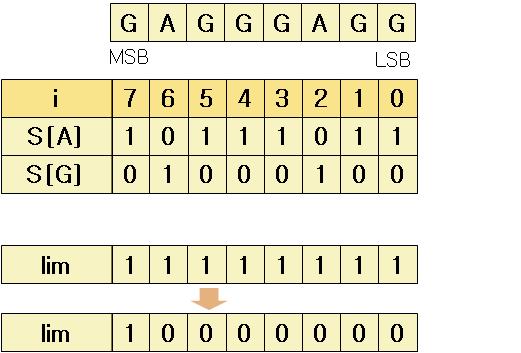
- 미리 배열속에 시프트 연산을 해놓는다. PreSo( 비트별로 Or를 취해서 0이 나오면 찾는방식 )
4. Morris_Pratt Text Search
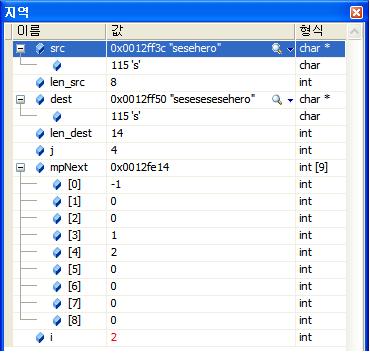 1) 대상 문자열이 "sesesesesehero" , 찾고자 하는 문자열 "sesehero" 일때 대상문자열 인덱스가 4이면 's' 인데 'h' 랑 비교했을때 틀리므로 비교를 다시 시작한다. 이때 접두, 접미를 이용하게 되는데
1) 대상 문자열이 "sesesesesehero" , 찾고자 하는 문자열 "sesehero" 일때 대상문자열 인덱스가 4이면 's' 인데 'h' 랑 비교했을때 틀리므로 비교를 다시 시작한다. 이때 접두, 접미를 이용하게 되는데
찾고자 하는 문자열 인덱스가 2이면 's' 인데 's'랑 다시 비교한다.
2) 결국 처음부터 다시 비교해야 하는 비용 '2'를 아끼게 된 꼴이 되므로 효율적이다.
5. Knuth_Morris_Pratt Text Search
6. Boyer - Moore Text Search
more..
#include <stdio.h>
#include <string.h>
#define OUTPUT(x) printf("index:%2d\n",(x))
void BF(char *src, int len_src, char *dest, int len_dest)
{
int i, j;
for( i = 0; i <= len_dest - len_src; ++i )
{
for( j = 0; j < len_src && src[j] == dest[i+j]; ++j )
;
if( j >= len_src )
OUTPUT(i);
}
}
int main()
{
char str[] = "acgagggaggputer";
char search_str[] = "gagggagg";
BF( search_str, strlen(search_str), str, strlen(str) );
return 0;
}
#include <string.h>
#define OUTPUT(x) printf("index:%2d\n",(x))
void BF(char *src, int len_src, char *dest, int len_dest)
{
int i, j;
for( i = 0; i <= len_dest - len_src; ++i )
{
for( j = 0; j < len_src && src[j] == dest[i+j]; ++j )
;
if( j >= len_src )
OUTPUT(i);
}
}
int main()
{
char str[] = "acgagggaggputer";
char search_str[] = "gagggagg";
BF( search_str, strlen(search_str), str, strlen(str) );
return 0;
}
2. Karp-Rabin Text Search
more..
// 각자리의 아스키 코드에 2^0 2^1, 2^3.. 을 곱해서 해쉬값을 만들어 낸다.
hx = (hx<<1) + src[i];
hy = (hy<<1) + dest[i];
// 십진시프트를 이용한 거랑 비슷하다.
// itoa의 방식
// Sum = Sum*10 + a[i] - '0'
// 맨앞의 값만 삭제하고 다른 자리에는 2만 곱해주면 자릿수가 변경된다.
// 처음) h*2^4 + e*2^3 + l*2^2 + l*2^1 + o*2^0
// 다음) e*2^4 + l*2^3 + l*2^2 + o*2^1 + w*2^0
hy = ((hy - dest[i]*d)<<1) + dest[i+len_src];
hx = (hx<<1) + src[i];
hy = (hy<<1) + dest[i];
// 십진시프트를 이용한 거랑 비슷하다.
// itoa의 방식
// Sum = Sum*10 + a[i] - '0'
// 맨앞의 값만 삭제하고 다른 자리에는 2만 곱해주면 자릿수가 변경된다.
// 처음) h*2^4 + e*2^3 + l*2^2 + l*2^1 + o*2^0
// 다음) e*2^4 + l*2^3 + l*2^2 + o*2^1 + w*2^0
hy = ((hy - dest[i]*d)<<1) + dest[i+len_src];
#include <stdio.h>
#include <string.h>
#define OUTPUT(x) printf("index:%2d\n",(x))
void KR(char *src, int len_src, char *dest, int len_dest)
{
int d, hx, hy, i;
for( d=i=1; i < len_src; i++ )
d <<= 1;
for( hy = hx = i =0; i < len_src; i++ )
{
hx = (hx<<1) + src[i];
hy = (hy<<1) + dest[i];
}
for( i = 0; i < len_dest-len_src; i++ )
{
if( hx == hy && memcmp(src, dest+i, len_src) == 0)
OUTPUT(i);
hy = ((hy - dest[i]*d)<<1) + dest[i+len_src];
}
}
int main()
{
char str[] = "acgagggaggputer";
char search_str[] = "gagggagg";
KR( search_str, strlen(search_str), str, strlen(str) );
return 0;
}
#include <string.h>
#define OUTPUT(x) printf("index:%2d\n",(x))
void KR(char *src, int len_src, char *dest, int len_dest)
{
int d, hx, hy, i;
for( d=i=1; i < len_src; i++ )
d <<= 1;
for( hy = hx = i =0; i < len_src; i++ )
{
hx = (hx<<1) + src[i];
hy = (hy<<1) + dest[i];
}
for( i = 0; i < len_dest-len_src; i++ )
{
if( hx == hy && memcmp(src, dest+i, len_src) == 0)
OUTPUT(i);
hy = ((hy - dest[i]*d)<<1) + dest[i+len_src];
}
}
int main()
{
char str[] = "acgagggaggputer";
char search_str[] = "gagggagg";
KR( search_str, strlen(search_str), str, strlen(str) );
return 0;
}
3. Shift Or Text Search
more..

- 미리 배열속에 시프트 연산을 해놓는다. PreSo( 비트별로 Or를 취해서 0이 나오면 찾는방식 )
#include <stdio.h>
#include <string.h>
#define ASIZE 256 #define OUTPUT(x) printf("index:%2d\n",(x))
int preSo(char *x, int m, unsigned int S[])
{
unsigned int j, lim;
int i;
for (i = 0; i < ASIZE; ++i)
S[i] = ~0;
for (lim = i = 0, j = 1; i < m; ++i, j <<= 1)
{
S[x[i]] &= ~j;
lim |= j;
}
lim = ~(lim>>1);
return(lim);
}
void SO(char *src, int len_src, char *dest, int len_dest)
{
unsigned int lim, state;
unsigned int S[ASIZE];
int j;
lim = preSo(src, len_src, S); // lim = 111111100
for (state = ~0, j = 0; j < len_dest; ++j)
{
state = (state<<1) | S[dest[j]];
if (state < lim)
OUTPUT(j - len_src + 1);
}
}
int main()
{
char str[] = "acagaggaggacttcact";
char search_str[] = "gagg";
SO( search_str, strlen(search_str), str, strlen(str) );
return 0;
}
#include <string.h>
#define ASIZE 256 #define OUTPUT(x) printf("index:%2d\n",(x))
int preSo(char *x, int m, unsigned int S[])
{
unsigned int j, lim;
int i;
for (i = 0; i < ASIZE; ++i)
S[i] = ~0;
for (lim = i = 0, j = 1; i < m; ++i, j <<= 1)
{
S[x[i]] &= ~j;
lim |= j;
}
lim = ~(lim>>1);
return(lim);
}
void SO(char *src, int len_src, char *dest, int len_dest)
{
unsigned int lim, state;
unsigned int S[ASIZE];
int j;
lim = preSo(src, len_src, S); // lim = 111111100
for (state = ~0, j = 0; j < len_dest; ++j)
{
state = (state<<1) | S[dest[j]];
if (state < lim)
OUTPUT(j - len_src + 1);
}
}
int main()
{
char str[] = "acagaggaggacttcact";
char search_str[] = "gagg";
SO( search_str, strlen(search_str), str, strlen(str) );
return 0;
}
4. Morris_Pratt Text Search
more..

찾고자 하는 문자열 인덱스가 2이면 's' 인데 's'랑 다시 비교한다.
2) 결국 처음부터 다시 비교해야 하는 비용 '2'를 아끼게 된 꼴이 되므로 효율적이다.
#include <stdio.h>
void preMp( char* src, int len_src, int mpNext[] )
{
int i, j;
i = 0;
j = mpNext[0] = -1;
// 반복되는 문자를 찾아서 인덱스를 만들어준다.
while( i < len_src )
{
while( j > -1 && src[i] != src[j] )
j = mpNext[j];
mpNext[++i] = ++j;
}
}
void MP( char* src, int len_src, char* dest, int len_dest )
{
int i, j, mpNext[20];
preMp( src, len_src, mpNext );
i = j = 0;
while( j < len_dest )
{
// sesese를 만났을때 se~이후부터 비교를 시작한다.
while( i > -1 && src[i] != dest[j] )
i = mpNext[i];
++i;
++j;
if( i >= len_src )
{
printf( "%d\n", j - i );
i = mpNext[i];
}
}
}
int main()
{
char y[] = "sesesesesehero";
char x[] = "sesehero";
MP( x, strlen(x), y, strlen(y) );
return 0;
}
void preMp( char* src, int len_src, int mpNext[] )
{
int i, j;
i = 0;
j = mpNext[0] = -1;
// 반복되는 문자를 찾아서 인덱스를 만들어준다.
while( i < len_src )
{
while( j > -1 && src[i] != src[j] )
j = mpNext[j];
mpNext[++i] = ++j;
}
}
void MP( char* src, int len_src, char* dest, int len_dest )
{
int i, j, mpNext[20];
preMp( src, len_src, mpNext );
i = j = 0;
while( j < len_dest )
{
// sesese를 만났을때 se~이후부터 비교를 시작한다.
while( i > -1 && src[i] != dest[j] )
i = mpNext[i];
++i;
++j;
if( i >= len_src )
{
printf( "%d\n", j - i );
i = mpNext[i];
}
}
}
int main()
{
char y[] = "sesesesesehero";
char x[] = "sesehero";
MP( x, strlen(x), y, strlen(y) );
return 0;
}
5. Knuth_Morris_Pratt Text Search
more..
1) Morris_Pratt 알고리즘에서 PreMp 만 수정한 알고리즘. ( Knuth 할아버지.. )
- 핵심은 접두를 접미로 밀어봐도 틀린 값이라면 틀린만큼 더 밀어준다는 개념이다.
- 틀린 값의 비교를 절약하므로 Morris 보다도 효율적이다.
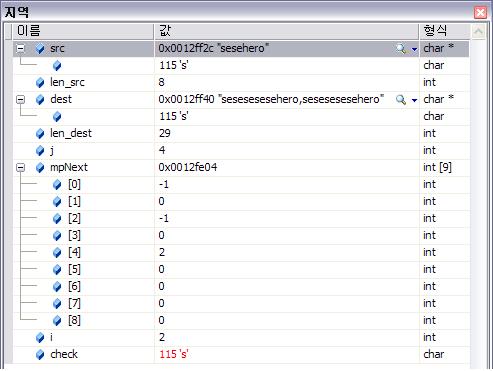
- 핵심은 접두를 접미로 밀어봐도 틀린 값이라면 틀린만큼 더 밀어준다는 개념이다.
- 틀린 값의 비교를 절약하므로 Morris 보다도 효율적이다.

void preKmp( char *src, int len_src, int mpNext[] )
{
int i, j;
i = 0;
j = mpNext[0] = -1;
while (i < len_src)
{
while (j > -1 && src[i] != src[j])
j = mpNext[j];
i++;
j++;
if (src[i] == src[j])
mpNext[i] = mpNext[j];
else
mpNext[i] = j;
}
}
{
int i, j;
i = 0;
j = mpNext[0] = -1;
while (i < len_src)
{
while (j > -1 && src[i] != src[j])
j = mpNext[j];
i++;
j++;
if (src[i] == src[j])
mpNext[i] = mpNext[j];
else
mpNext[i] = j;
}
}
6. Boyer - Moore Text Search
more..
1) 뒤에서 부터 비교후, 틀리다면 A와 맞는곳으로 이동
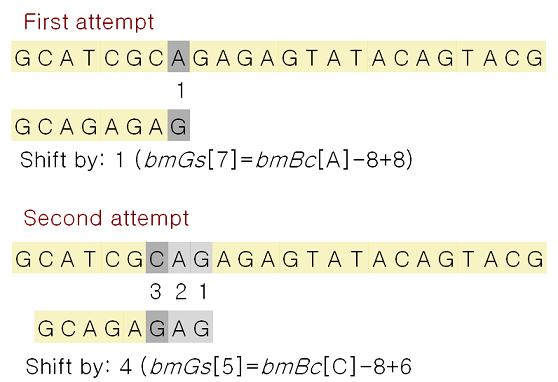 2) C와 비교후 틀리다면 C까지 땡겨서 비교한다. 그후에, 끝이 G이므로 G가 나올때까지 땡긴다.
2) C와 비교후 틀리다면 C까지 땡겨서 비교한다. 그후에, 끝이 G이므로 G가 나올때까지 땡긴다.
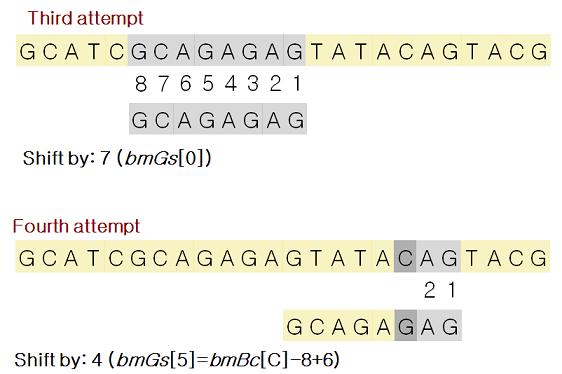


#include <stdio.h>
#define OUTPUT(x) printf("index:%2d\n",(x))
#define MAX(a,b) (((a)>(b))?(a):(b))
#define ASIZE 256
#define XSIZE 256
void preBmBc(char *src, int len_src, int bmBc[])
{
int i;
for (i = 0; i < ASIZE; ++i)
bmBc[i] = len_src;
for (i = 0; i < len_src - 1; ++i)
bmBc[src[i]] = len_src - i - 1;
}
void suffixes(char *src, int len_src, int *suff)
{
int f, g, i;
suff[len_src - 1] = len_src;
g = len_src - 1;
for (i = len_src - 2; i >= 0; --i)
{
if (i > g && suff[i + len_src - 1 - f] < i - g)
suff[i] = suff[i + len_src - 1 - f];
else
{
if (i < g)
g = i;
f = i;
while (g >= 0 && src[g] == src[g + len_src - 1 - f])
--g;
suff[i] = f - g;
}
}
}
void preBmGs(char *src, int len_src, int bmGs[])
{
int i, j, suff[XSIZE];
suffixes(src, len_src, suff);
for (i = 0; i < len_src; ++i)
bmGs[i] = len_src;
j = 0;
for (i = len_src - 1; i >= 0; --i)
if (suff[i] == i + 1)
for (; j < len_src - 1 - i; ++j)
if (bmGs[j] == len_src)
bmGs[j] = len_src - 1 - i;
for (i = 0; i <= len_src - 2; ++i)
bmGs[len_src - 1 - suff[i]] = len_src - 1 - i;
}
void BM(char *src, int len_src, char *dest, int len_dest)
{
int i, j, bmGs[XSIZE], bmBc[ASIZE];
/* Preprocessing */
preBmGs(src, len_src, bmGs);
preBmBc(src, len_src, bmBc);
/* Searching */
j = 0;
while (j <= len_dest - len_src)
{
for (i = len_src - 1; i >= 0 && src[i] == dest[i + j]; --i);
if (i < 0)
{
OUTPUT(j);
j += bmGs[0];
}
else
j += MAX(bmGs[i], bmBc[dest[i + j]] - len_src + 1 + i);
}
}
int main()
{
char y[] = "seseserahero";
char x[] = "seserahero";
BM( x, strlen(x), y, strlen(y) );
return 0;
}
#define OUTPUT(x) printf("index:%2d\n",(x))
#define MAX(a,b) (((a)>(b))?(a):(b))
#define ASIZE 256
#define XSIZE 256
void preBmBc(char *src, int len_src, int bmBc[])
{
int i;
for (i = 0; i < ASIZE; ++i)
bmBc[i] = len_src;
for (i = 0; i < len_src - 1; ++i)
bmBc[src[i]] = len_src - i - 1;
}
void suffixes(char *src, int len_src, int *suff)
{
int f, g, i;
suff[len_src - 1] = len_src;
g = len_src - 1;
for (i = len_src - 2; i >= 0; --i)
{
if (i > g && suff[i + len_src - 1 - f] < i - g)
suff[i] = suff[i + len_src - 1 - f];
else
{
if (i < g)
g = i;
f = i;
while (g >= 0 && src[g] == src[g + len_src - 1 - f])
--g;
suff[i] = f - g;
}
}
}
void preBmGs(char *src, int len_src, int bmGs[])
{
int i, j, suff[XSIZE];
suffixes(src, len_src, suff);
for (i = 0; i < len_src; ++i)
bmGs[i] = len_src;
j = 0;
for (i = len_src - 1; i >= 0; --i)
if (suff[i] == i + 1)
for (; j < len_src - 1 - i; ++j)
if (bmGs[j] == len_src)
bmGs[j] = len_src - 1 - i;
for (i = 0; i <= len_src - 2; ++i)
bmGs[len_src - 1 - suff[i]] = len_src - 1 - i;
}
void BM(char *src, int len_src, char *dest, int len_dest)
{
int i, j, bmGs[XSIZE], bmBc[ASIZE];
/* Preprocessing */
preBmGs(src, len_src, bmGs);
preBmBc(src, len_src, bmBc);
/* Searching */
j = 0;
while (j <= len_dest - len_src)
{
for (i = len_src - 1; i >= 0 && src[i] == dest[i + j]; --i);
if (i < 0)
{
OUTPUT(j);
j += bmGs[0];
}
else
j += MAX(bmGs[i], bmBc[dest[i + j]] - len_src + 1 + i);
}
}
int main()
{
char y[] = "seseserahero";
char x[] = "seserahero";
BM( x, strlen(x), y, strlen(y) );
return 0;
}

